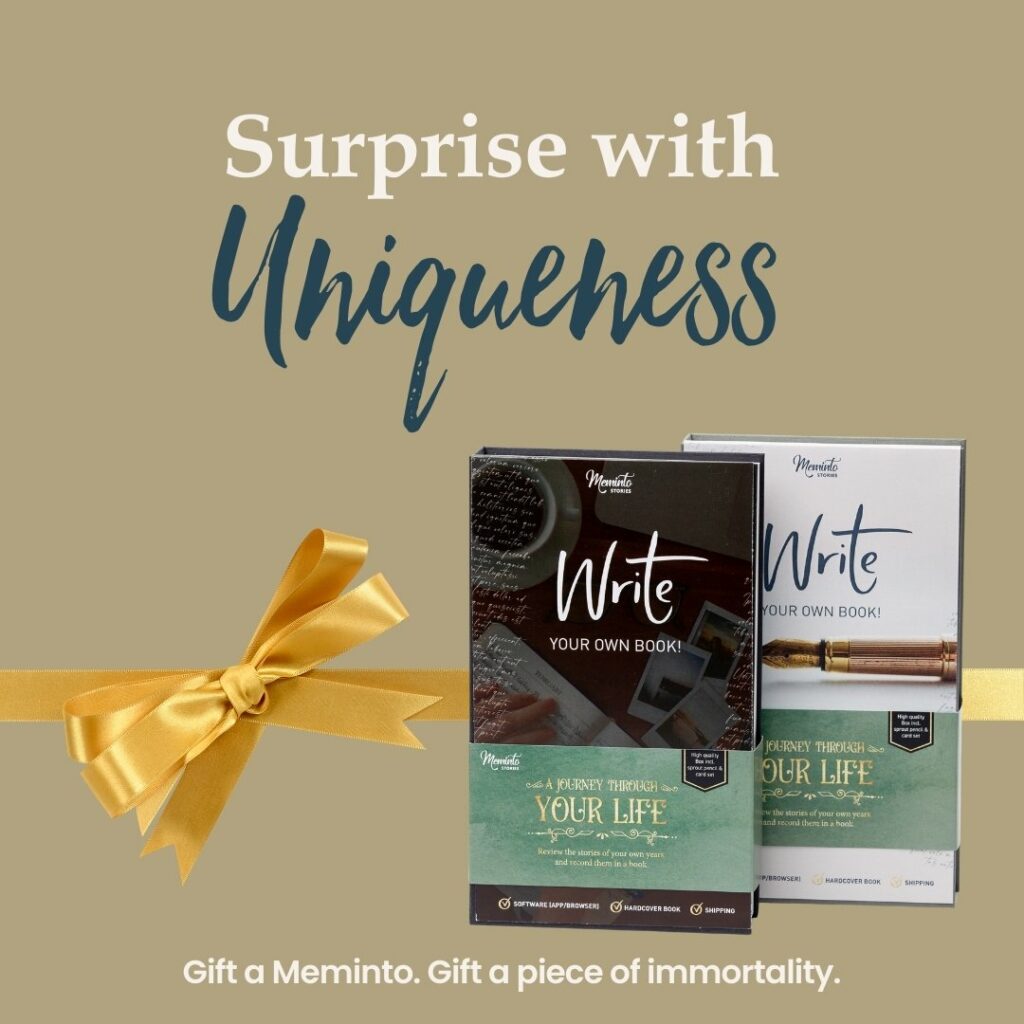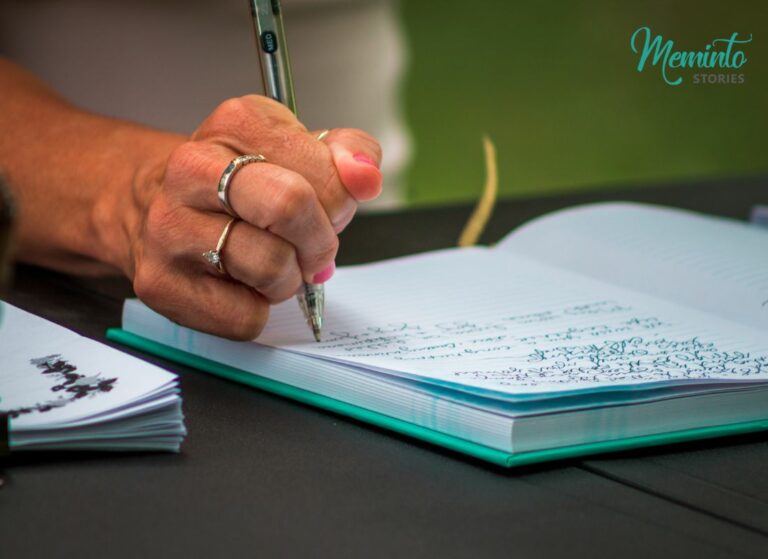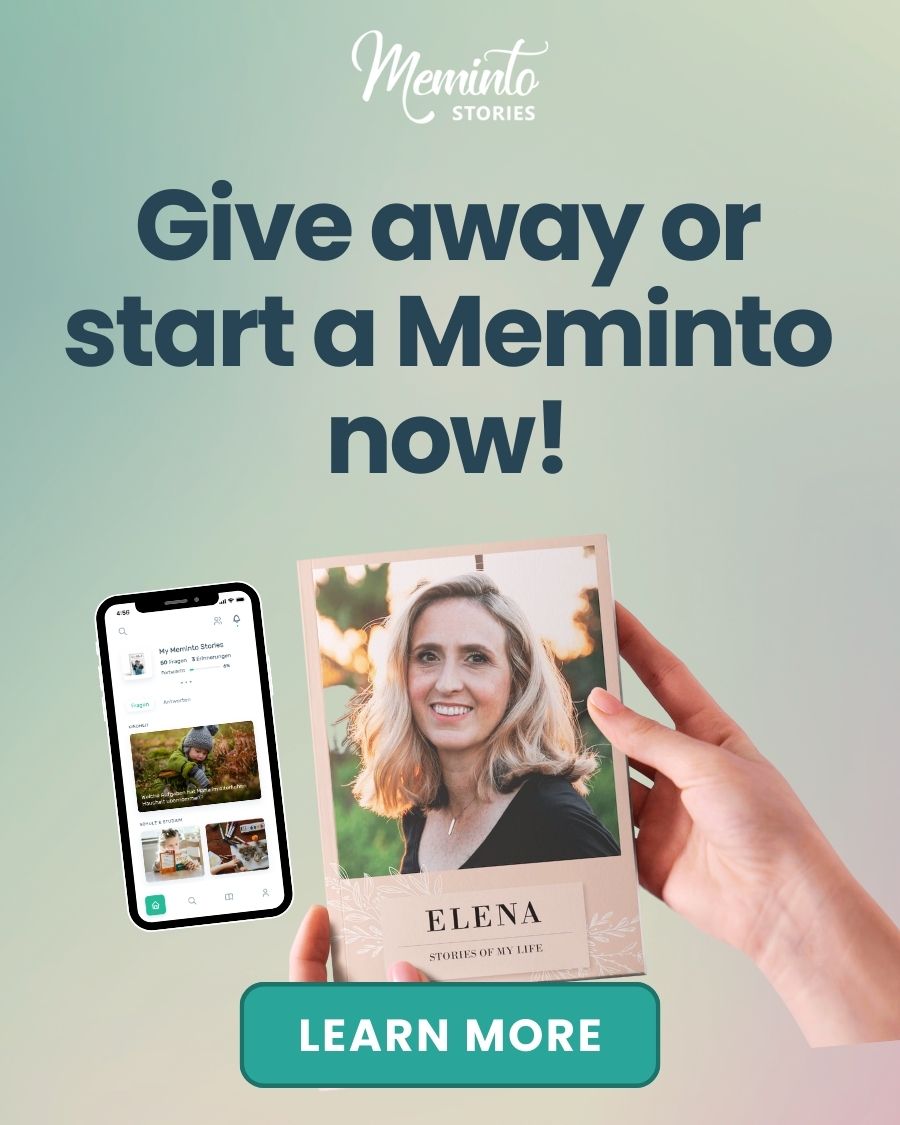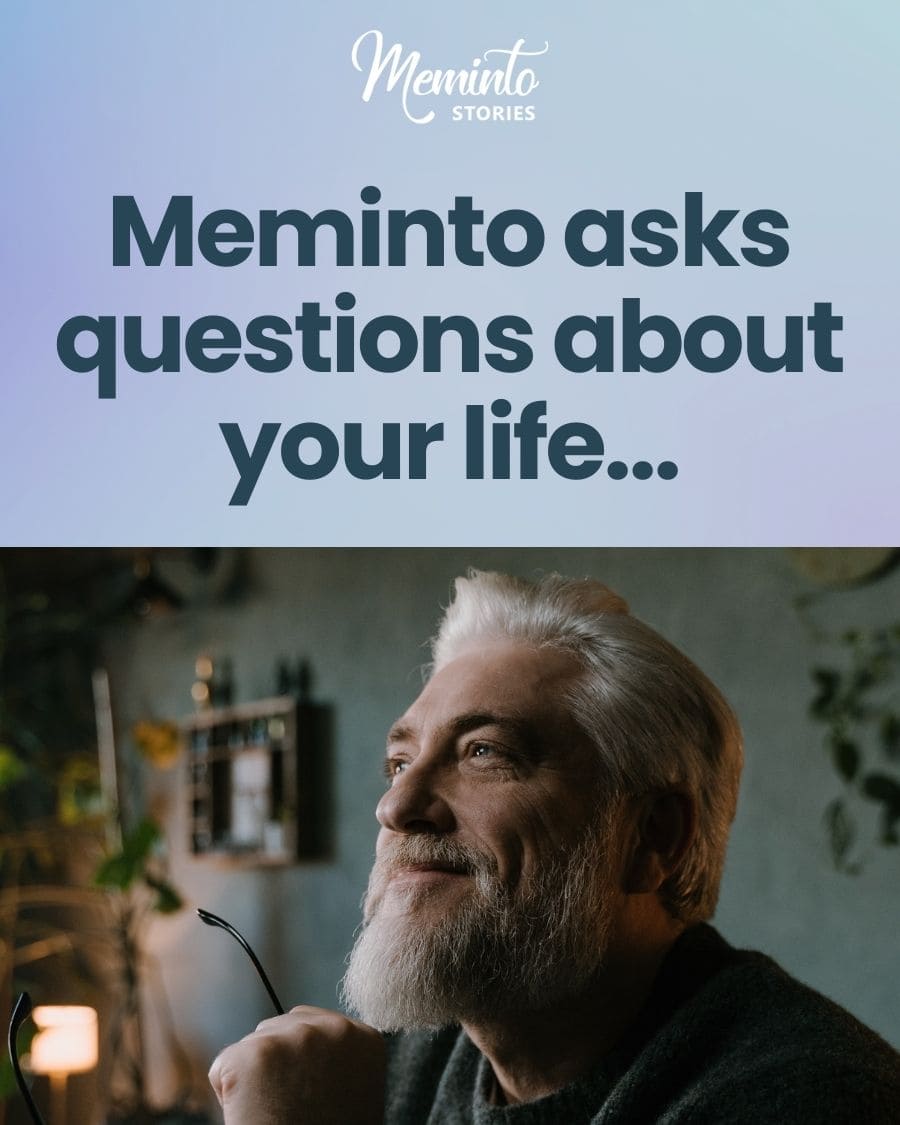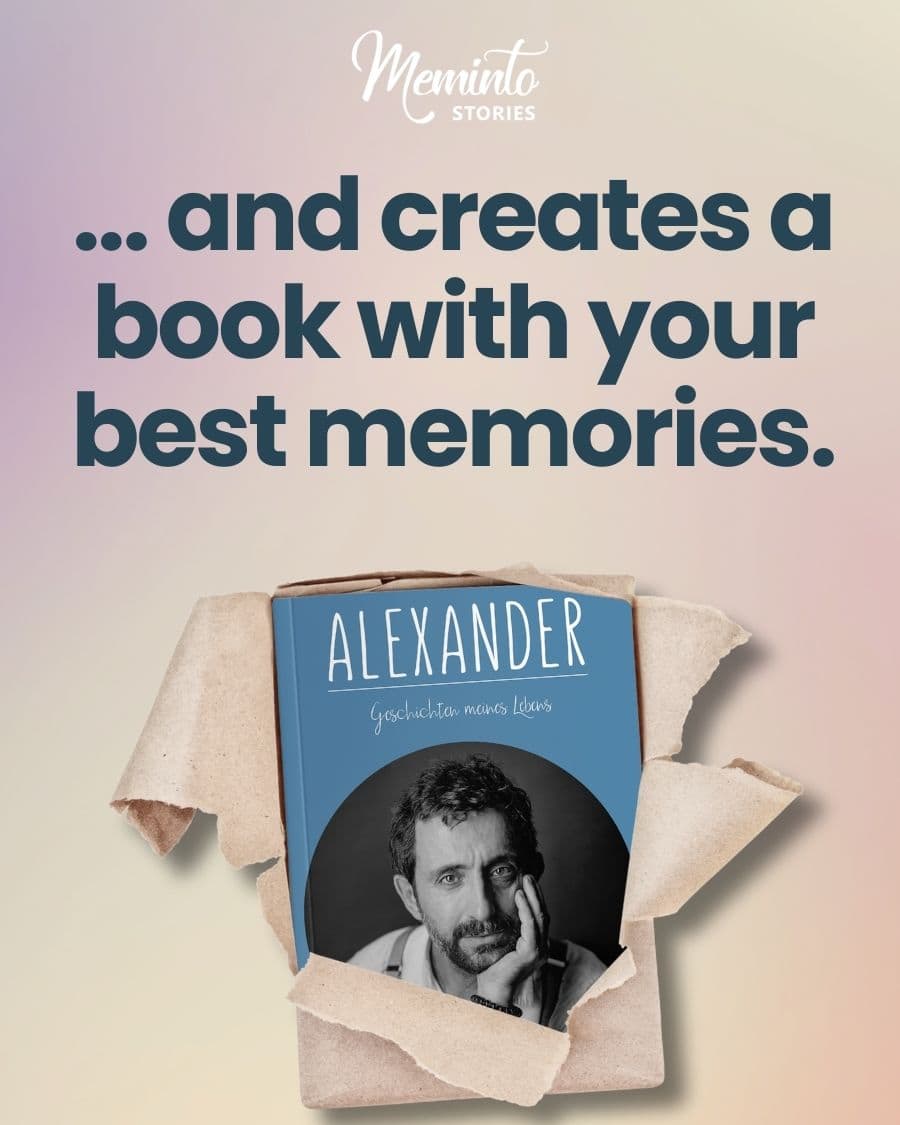Graduation season is deadlines, late nights, and a blur of “lasts.” If you want a graduation memory book you’ll actually open years from now – not just another scroll of photos – start with moments you can feel, not just scenes you can see.
“My daughter asked me to write something down,” shares Jost, a Meminto user from Germany. This demonstrates that documenting important moments is crucial at every stage of life. For graduates and their families, senior year deserves the same careful preservation.
As another user discovered, “I wrote the whole book on my smartphone and am amazed at how well it worked,” proving that creating a graduation memory book doesn’t have to be complicated. Whether you’re documenting cap-toss moments or final goodbyes, these seven graduation memory book ideas will help you preserve memories that deserve a spot on the wall.
Why most graduates regret not documenting their senior year
You’ll forget more than you think.
We forget fast. Research shows we lose up to 50% of new information within an hour and 90% within a week. Here’s the twist: when we document mainly for social media, our memories get less precise. Princeton researchers found that quick posting can offload the experience in our minds, so we store fewer details.
That is why intentional documentation matters. Add context, not just a photo: names, place, one sensory detail, and why it mattered. Graduation is a high-adrenaline blur, so the ceremony sticks, but the small moments, like parking-lot jokes and the weight of your cap in your hand, fade first.
“Much like opaque filters we apply to pictures on social media, the vibrancy of our memories dims and fades over time,” Boston College researchers report. For something as emotionally charged as senior year, our brains tend to focus on the big moments, such as the ceremony, the cap toss, and acceptance letters. At the same time, the everyday magic often slips away unnoticed.
But here’s why graduates regret not documenting: it’s not just about forgetting. It’s about losing the ability to share your story.
“I already forgot everything,” jokes one recent graduate in their Instagram caption, but the sentiment reveals a deeper truth. Many graduates find themselves saying variations of this same thing within months of walking across that stage.
Twenty years from now, when your child asks, “What was high school like for you?” you’ll have vague generalizations instead of specific stories. You’ll say, “It was fun,” instead of describing the time your entire class got detention because of a senior prank that went too far.
During challenging moments in college or your early career, you can’t revisit the person who was brave enough to run for student council or confident enough to try out for the play. Those defining moments become fuzzy inspiration instead of concrete proof of your capabilities.
When your favorite teacher retires or your high school bestie gets married, you want to share specific memories in your speech or card. Instead, you’re left with “You were great” because you can’t remember the details of how they changed your life.
The graduates who documented their senior year can open their book on a hard day and immediately transport back to feeling supported, excited, and full of possibility. Without documentation, you know you felt that way, but can’t access those feelings when you need them most.
Every senior class also experiences world events, cultural shifts, and technological changes that seem normal at the time but become fascinating in hindsight. Without your perspective documented, you lose your place in that unique moment in history.
The graduates who document their senior year never wonder, “What exactly happened that year?” They know. And more importantly, they can share those stories with the people they love.
7 graduation memory book ideas that deserve a spot on your wall
You don’t need to be a scrapbooking expert to create something meaningful. These graduation scrapbook ideas emphasize authentic moments, rather than Pinterest-perfect layouts.
These seven graduation memory book ideas work whether you’re documenting your senior year or helping preserve this milestone for someone you love. Each one focuses on the details that standard graduation photos miss. Most importantly, they fit into the chaos of senior year without adding stress.
The Meminto Life Book.
Answer a life question weekly and hold a real book in your hands within a year.
1. Cap-Toss photo strip
There’s something magical about that split second when hundreds of caps fly through the air together, as one graduate put it in her Instagram caption, “Cap. Gown. It’s going down.” However, most photos only capture the aftermath: caps scattered on the ground, rather than the pure joy of the moment itself.
Create a film strip-style layout with burst photos of your cap toss, or use a single great shot with handwritten details surrounding it. Think old-school photo booth strips that tell the whole story of this moment by answering questions like:
- What song was playing in your head during the ceremony?
- Describe the exact moment you knew “this is really happening”.
- What did your parents’ faces look like from the stage?
- How heavy did your cap feel before you threw it?
- What was the first thing you wanted to do after walking across the stage?
It’s not just about the photo, but preserving that feeling of pure possibility when everything felt within reach. When you’re struggling through your first semester of college, drowning in student loans, or questioning if you made the right choices, this page becomes proof that you once felt invincible. You’ll look at that flying cap and remember: “I did something huge. I can do huge things again.”
As Reiner discovered when creating his family’s memory book, “I wrote the whole book on my smartphone and am amazed at how well it worked despite the small display.” These prompts work perfectly in Meminto’s guided format, turning scattered thoughts into organized memories that will last decades.
2. Ticket-Stub collage
Your nightstand drawer is probably full of them: crumpled tickets from the homecoming game where it rained sideways, the winter formal where your date’s boutonniere fell off during the first slow song, that regional playoff game where everyone lost their voices screaming. Most people toss these scraps, but you’re smarter than that.
Turn those ticket stubs into a corkboard collage, then photograph it for your memory book. Each stub gets a story, and suddenly you have a visual timeline of senior year that no Instagram feed could match.
The questions that bring these moments back to life:
- Which event cost way too much but felt priceless in the moment?
- What did you wear to the dance where you kept this ticket?
- Who did you sit next to at the game that went into overtime?
- Which event made you feel most like a “real” senior?
- What snack did you sneak into the theater for this movie?
- Which teacher chaperoned the dance where you got this ticket?
Barbara, who created a memory book about her mother, discovered something beautiful: “Now I listen to it from the book every time I miss her.”
Your future self will crave these same detailed memories when you’re homesick during college or feeling nostalgic years later. These ticket stubs become your way back to Friday night lights and the friends who screamed themselves hoarse beside you.
When you add these prompts to a platform like Meminto, each stub becomes a chapter in your senior year story, organized and preserved in a way that a shoebox under your bed never could be.
3. Playlist & lyrics page
Every graduating class has its songs. The ones that blasted from car windows during lunch breaks, the anthem that played at every party, that slow song from prom that still makes you feel seventeen again. Music is the fastest way to time travel, but without context, even your favorite songs become just melodies.
Create a QR code linking to your senior year playlist, then surround it with handwritten lyrics and stories. Album liner notes, but for your life. Include the songs that made you cry, the ones that pumped you up before big games, and especially the weird ones only your friend group understood.
Questions that turn a playlist into a story:
- Which song played during your first senior year breakdown?
- What was blasting when you got your college acceptance letter?
- Which artist did you discover during late-night study sessions?
- What song made your mom roll her eyes but secretly became her favorite, too?
- Which track always came on during drives with your best friend?
- What was the last song you heard in the school parking lot?
Just like Willi, who created his memory book “mainly as a keepsake for my grandchildren and great-grandchildren,” your future family will be fascinated by the soundtrack of your teenage years. Imagine your kids discovering that you were obsessed with the same artist they love, or your grandchildren laughing at the songs you thought were deep.
Music fades from streaming services, but when you preserve these song stories in a Meminto Life Book, you’re creating a playlist that will never disappear. Your voice explaining why each song mattered becomes the real treasure, and unlike a digital playlist, this physical book will outlast every streaming platform.
👉 In Meminto (2 minutes): Add a “Senior Year” chapter → paste your playlist link → record a 30-second voice note on why each song mattered. That voice becomes the keepsake, not the link.
4. Handwritten letters from friends & mentors
One of the most complex parts about graduating is realizing how many people quietly supported you along the way, and how their voices will scatter once you leave. The guidance counselor who calmed you down during college application panic attacks, the friend who picked you up every morning when your car broke down, the teacher who made you feel smart in their subject.
Most graduation memory books focus on documenting your thoughts, but what about preserving how others saw you during this pivotal year? Ask these important people to write just one line about their favorite memory with you on index cards. Some will surprise you with stories you didn’t know they remembered.
The questions to ask your people:
- What’s one thing about me that you hope I never change?
- What moment with me made you smile this year?
- What do you think I’ll be doing in ten years?
- What’s your favorite random memory of us together?
- What advice would you give me that you’ve never said out loud?
- Which of my quirks will you miss most?
Michael shared how his son encouraged him to document his stories: “My son asked me to write down my story, but I didn’t know how to begin.” This reverses that approach. You’re asking others to capture their memories of you, creating a collection of voices that will matter more with time.
When you’re struggling through your first college exam or feeling invisible at your new job, you can pull out these notes and remember that people noticed you and cared. While you’ll have the original handwritten cards, scanning them into a Meminto book ensures they’re preserved forever and provides a beautiful physical and digital keepsake that won’t fade or get lost during moves between dorm rooms and apartments.
5. Map of “lasts”
Senior year is a twelve-month goodbye tour. Last homecoming, last first day, last time eating cafeteria pizza, last locker slam. These moments hit differently when you know they’re ending, but they happen so fast you barely process them.
As Viktoria discovered when she created books for her scattered family, preserving memories becomes even more crucial when everyone goes their separate ways. “My family lives widely scattered. They were very happy” to have these shared experiences documented.
Take a map of your school and town, then mark every significant “last” with colored pins or stickers. Include spots like your final AP exam location, the parking spot where you said goodbye to your summer job, and the hallway where you had your last argument with your best friend before making up an hour later.
Each pin tells a story worth remembering:
- Where were you when you realized “this is my last time doing this”?
- Which “last” hit you harder than expected?
- What tradition did you participate in for the final time?
- Which everyday moment became precious once you knew it was ending?
- What location holds your most embarrassing senior year memory?
The physical map becomes a treasure when you’re missing home during your first semester away. A Meminto Memory Book lets you expand beyond the map, adding photos and voice recordings to each location. Years later, you’ll be able to virtually walk through your senior year and hear your voice explaining why that random corner by the science wing mattered so much.
6. Senior superlative selfie challenge
Remember elementary school yearbook superlatives? “Most Likely to Become Famous” and “Class Clown” felt so official back then. Senior year deserves better than generic categories chosen by popularity contests.
Create your superlatives based on who you’ve become this year, then take selfies that prove each one. “Most Likely to Survive on Energy Drinks and Spite” deserves documentation just as much as “Most Athletic.” The goal isn’t Instagram perfection, but capturing the quirky truth of your senior year.
“Very proud, very tired,” summed up one graduate’s Instagram caption perfectly, and that exhausted pride is precisely what these selfies should capture. Pose with your calculator after finally understanding calculus, snap a photo of yourself ugly crying over college acceptance letters, or document the moment you realized you could be an adult.
Self-assign these superlatives and prove them:
- Most likely to text back immediately or three weeks later, not in between
- Most likely to know every teacher’s coffee order
- Most likely to have a mental breakdown over lunch choices
- Most likely to graduate despite never using a planner
- Most likely to become successful out of pure stubbornness
- Most likely to cry during any movie, even comedies
Each Polaroid or phone screenshot becomes a mini time capsule. When adulthood becomes overwhelming and you forget that you were once confident enough to run for student government, these photos remind you of the person brave enough to document their weirdness.
Years from now, your kids will find these photos hilarious. More importantly, you’ll remember that being seventeen wasn’t just about checking boxes for college applications. It was about becoming someone interesting enough to laugh at.
7. Advice card flipbook
What would you tell yourself five years from now when you’re probably stressed about totally different things? Senior year feels like the end of the world and the beginning of everything all at once, which makes it the perfect time to create advice for your future selves.
Write each piece of advice on index cards, then bind them with a metal ring to create a flipbook you can carry anywhere. One card per milestone, one card per month, or one card per major life moment you know is coming.
Start with these senior year journal prompts for different future moments:
- Write one piece of advice to your future self five years out
- Describe who you are right now to your college graduation self
- Tell your future wedding day self what love means to you at seventeen
- Explain to your future parent self what you hope to remember about being young
- Write to your future self during your first heartbreak
- Describe your current dreams to the person you’ll be at thirty
As Anja discovered, there’s something powerful about finishing a meaningful project: “I am proud to hold my book in my hand finally. It brings me joy and satisfaction, and I can cross it off my bucket list.” This flipbook becomes your portable reminder of who you were when everything felt possible.
Twenty-two-year-old you might roll your eyes at some of these cards, but thirty-year-old you will be grateful. There’s something magical about receiving advice from someone who knew you before life got complicated, even if that someone is yourself.
Why graduation memories disappear faster than you think
Julia, a working mother in her forties, finds herself in a race against time. With her parents entering their seventies and eighties, and her father showing early signs of dementia, she’s desperately trying to capture their life stories before those memories disappear forever. She carves out evenings to call her dad and has become the family’s keeper of old photos and videos.
But the more she tries to preserve her parents’ past, the more she realizes how much has already been lost. Her father, now struggling with early dementia, can no longer recall details from experiences that once shaped his world. Important moments and meaningful relationships have faded despite feeling unforgettable at the time.
Julia’s urgent mission to save her parents’ memories reveals exactly how human memory works, and it explains why memories of high school or college graduation fade faster than we expect.
Research indicates that our brains are naturally designed to forget, rather than remember. The forgetting curve, first documented by psychologist Hermann Ebbinghaus in 1885, demonstrates that we lose information at predictable rates:
- 50% of new information disappears within 1 hour
- 70% is forgotten within 24 hours
- 90% vanishes within a week
- Only details that are actively rehearsed or emotionally significant survive long-term
Graduation memories face additional challenges beyond the normal process of forgetting. High-stress situations, such as ceremonies and significant life transitions, trigger the release of stress hormones that can interfere with the formation of memories. The adrenaline rush that makes the moment feel so vivid in real-time can prevent your brain from properly encoding the details you’ll want to remember later.
Senior year creates a perfect storm for memory loss because you’re processing multiple significant changes simultaneously. Your brain prioritizes immediate survival tasks over long-term memory storage when overwhelmed. Even positive stress, such as excitement and anticipation, can have the same memory-disrupting effects as negative stress.
Social media compounds the problem rather than solving it. Recent research published in the Journal of Experimental Social Psychology found that people who primarily documented their experiences through brief posts and photos formed less precise memories of those events. The act of briefly capturing a moment for sharing can trick your brain into thinking the memory is “saved” elsewhere, reducing the effort it puts into internal storage.
Julia’s father’s forgotten graduation details aren’t a sign of aging or memory problems. They’re the predictable result of how memory works when we don’t actively work to preserve what matters. His story reminds us that even moments that feel unforgettable in the present can slip away without being captured in a high school memory book or intentional documentation.
Get $10 off your first Meminto book project 📖
We appreciate you for reading this article. As a token of our gratitude, we would like to offer you a special $10 discount on your first book with Meminto!
Start preserving your graduation legacy today
Don’t let another day slip by wondering what you’ll forget next. Julia’s father can’t get back his high school memories, but you still have time to capture yours before they fade.
Start small. Pick one idea that resonates with you right now. It could be asking three people to write quick notes about their favorite memory with you, or creating that cap-toss photo strip from pictures you already have on your phone.
Write your story, your way. Start your first page in Meminto today.
As Reiner discovered, “I wrote the whole book on my smartphone and am amazed at how well it worked despite the small display.” Modern tools like Meminto make it simple to turn these graduation keepsake ideas into a professional book without the stress.
Your graduation memory book doesn’t have to be perfect. It just has to be yours. Start today, because once graduation is over, you can’t go back and collect these moments again.
(Works well for last-minute graduation gifts.)
The Meminto Life Book.
Answer a life question weekly and hold a real book in your hands within a year.
FAQ
-
What do you write in a graduation memory book? Specifics: names, places, one sensory detail, one feeling, and why it mattered.
-
How do I make one fast? Pick one idea above, spend 10 minutes, and add one photo + three lines of context. Done.
-
Print or digital? Do both. Print to keep, digital to share and add voice notes (QR). (Meminto supports both.)







